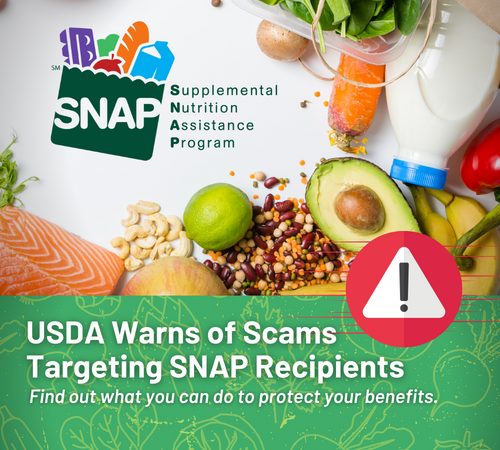EBT Card Skimming and Phishing Scams Impacting SNAP Recipients
The United States Department of Agriculture, Food and Nutrition Service (USDA-FNS) has provided information on reports of SNAP fraud, in which thieves use “card skimming” or phishing scams to steal SNAP benefits.
“While card skimming and phishing scams can impact anyone who uses a credit, debit or EBT card, they may hit SNAP households—who rely on their monthly benefits to buy food for themselves and their families—the hardest. What these thieves are doing is deplorable, and FNS will not tolerate it in our programs. We are working with our state and federal partners to protect your SNAP benefits.”—Cindy Long, Administrator of the USDA Food and Nutrition Service
EBT Card Skimming
The issue of skimmed EBT benefits is an increasingly prevalent problem nationwide. Ongoing efforts by local, state, and federal law enforcement agencies aim to investigate and ultimately prosecute those responsible.
Card skimming scams directly copy card and PIN information from EBT users at SNAP-approved retailers, using authorized EBT point of sale (POS) devices. Scammers use a physical overlay device with Bluetooth technology to temporarily take over a retailer’s POS device. Once thieves gain access to the POS device, they can steal (skim) and then remotely transmit the EBT card/PIN information to an offsite location. Thieves then use this data to create a duplicate version of the card which enables them to remotely access the SNAP recipient’s account and benefits.
Card skimming can happen to anyone that uses a credit, debit or EBT card, including SNAP participants. Most often, retailers and victims of skimming are caught unaware that any theft has occurred until their EBT card information and benefits have already been stolen. SNAP recipients who have experienced skimming often find out when they attempt to make a new purchase or check their EBT card balance.
SNAP Phishing Scam
There also continues to be reports of criminals using phony text messages to obtain EBT card numbers and PINs to steal SNAP benefits. These are known as phishing scams and are a type of fraud.
Generally, phishing scams appear as an official and legitimate email, SMS (text) message, or phone call that solicits confidential account information from an EBT household. These fraudulent messages often direct the SNAP recipient to a third-party website or attempt to coax the person into providing their EBT card number and PIN, enabling scammers to create a point of access with which they steal the victim’s SNAP benefits.
Recently, phishing scams have employed deceptive tactics ranging from “smart tablet giveaways,” in which SNAP recipients are asked to submit personal case information to participate, to fraudulent requests for EBT card and PIN information in order to access Pandemic Electronic Benefit Transfer (P-EBT) food benefits or to unlock an EBT account. The SNAP Office will never ask for SNAP EBT card account information by phone or email.
SNAP recipients can take the steps below to reduce risk and better safeguard their EBT card from skimming and phishing scams.
Safeguarding EBT Cards
USDA and FSSA encourages SNAP participants to take the following actions to help prevent theft of SNAP benefits from scammers:
· Keep the SNAP EBT PIN a secret. Do not share your PIN with anyone outside your household. Cover the keypad when you enter your PIN on a machine.
· Check the SNAP EBT account regularly for unauthorized charges. Change the EBT PIN immediately to stop the thief from making any new purchases. By changing the PIN anyone attempting to gain access to the EBT account via a duplicate card will be restricted.
· Check card reading machines to make sure there’s nothing suspicious attached to the card swiper or keypad. The skimming device can be difficult to detect but are often bigger than the original machine and may hide parts of the machine.
- Report stolen/skimmed cards immediately
- Call the EBT Customer Service Helpline at 1-888-328-6399
- Or visit www.connectebt.com or the ConnectEBT mobile app
- FSSA Benefits Portal
When reporting an EBT card lost or stolen using the above methods, the client will also have the option to order a replacement card. The EBT Customer Service Helpline is available 24 hours per day, 7 days per week, and assists Arabic, Chinese, English, Haitian-Creole, Italian, Korean, Russian, and Spanish speakers.




